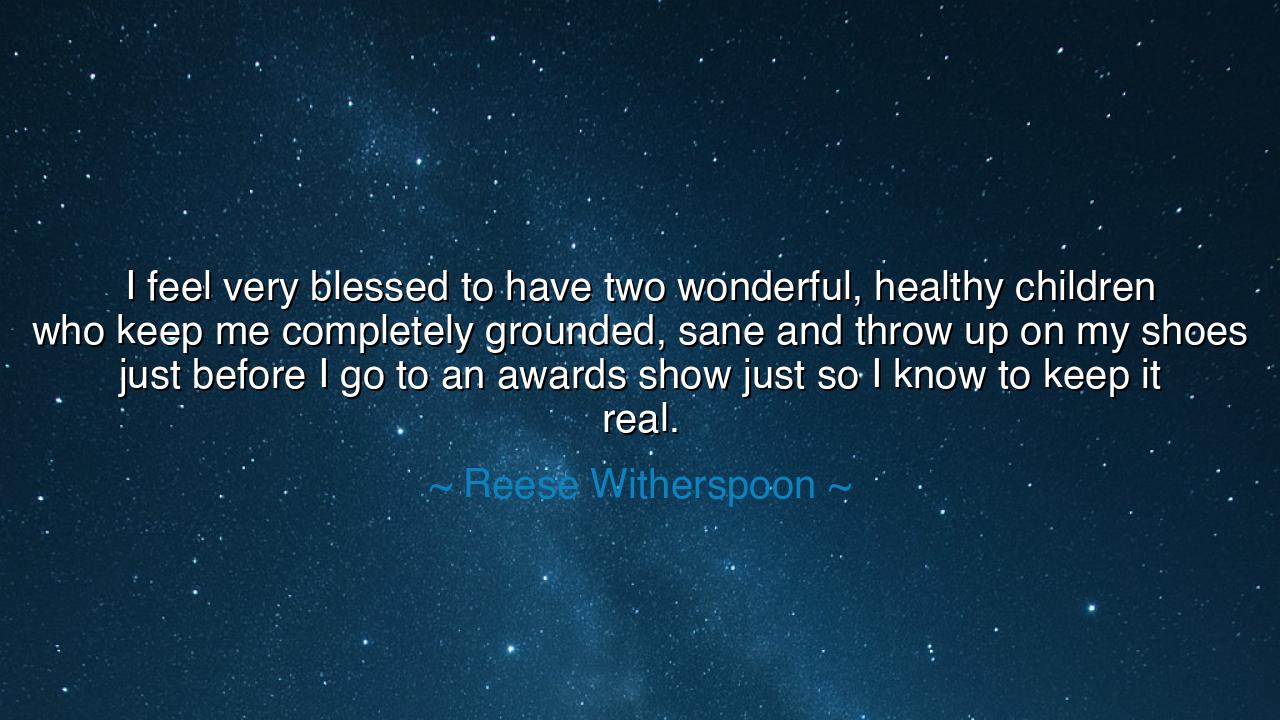
I feel very blessed to have two wonderful, healthy children who
I feel very blessed to have two wonderful, healthy children who keep me completely grounded, sane and throw up on my shoes just before I go to an awards show just so I know to keep it real.






Reese Witherspoon, a woman honored by the world yet humbled by her home, once spoke with laughter and sincerity: “I feel very blessed to have two wonderful, healthy children who keep me completely grounded, sane, and throw up on my shoes just before I go to an awards show just so I know to keep it real.” Beneath the humor of these words lies a treasure of wisdom—that children, in their innocence and unpredictability, strip away the illusions of grandeur and remind their parents of what truly matters.
The meaning here is layered with irony and beauty. Fame and success, though glittering to the eyes of the world, are fleeting shadows; but the laughter, chaos, and love of children are enduring. Witherspoon admits that her children anchor her spirit, saving her from the vanity that can consume those who walk in the spotlight. Even in the moments of inconvenience—when a child is sick, messy, or demanding—there is hidden grace. These interruptions are not humiliations, but holy reminders that a parent’s worth is not in trophies or applause, but in love given and received.
History offers many mirrors to this truth. Consider the story of Marcus Aurelius, the Roman emperor and philosopher. Though ruler of an empire, he wrote in his Meditations that family life and the innocence of children kept him tethered to humility. He knew that emperors could be deceived by power, but a child’s cry or laughter could restore perspective. Like Witherspoon’s shoes soiled before a ceremony, the disruptions of family life reminded him that greatness is not found in public honor but in private devotion.
Witherspoon’s words also speak of the paradox of grounding. For the world may place one on pedestals, but children bring the parent back to earth. They do so not maliciously, but naturally, for their lives are still untouched by pretense. They do not care for gowns, awards, or applause; they care for presence, for affection, for the simplicity of being together. In this way, children become teachers, showing their parents that reality is not in the artificial glow of fame, but in the rawness of daily life.
There is also something deeply heroic in embracing these moments. Many could see the sickness, the mess, or the interruptions as burdens. But Witherspoon transforms them into blessings. She names her children as the source of her sanity, the very shield that protects her against the corruption of pride. This is wisdom: to see in the chaos of family life not an obstacle, but the very medicine of the soul. The parent who learns to laugh when inconvenienced, who finds gratitude even in spilled milk or soiled shoes, discovers the secret of joy.
The lesson is clear: in your own life, do not despise the moments that humble you. When your children delay you, embarrass you, or demand from you, remember that these are the very moments that anchor your soul. They keep you real, they keep you human, they keep you awake to what truly matters. Let the world chase applause; let you chase the love that fills your home. For in the end, no award can comfort you like the embrace of your child.
Therefore, let Reese Witherspoon’s words endure as both humor and holy counsel. The parent’s life is not polished, but messy. It is not orderly, but full of interruptions. Yet these interruptions are gifts, reminders that our greatness is not in being celebrated, but in being faithful to those who love us without condition. Let future generations remember: to be kept humble by a child’s unpredictability is to be kept close to truth itself.






AAdministratorAdministrator
Welcome, honored guests. Please leave a comment, we will respond soon